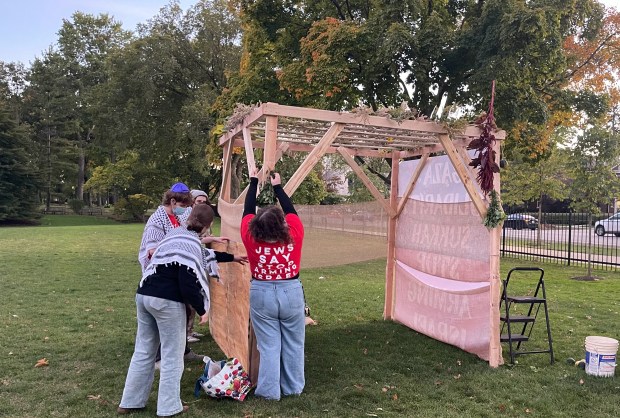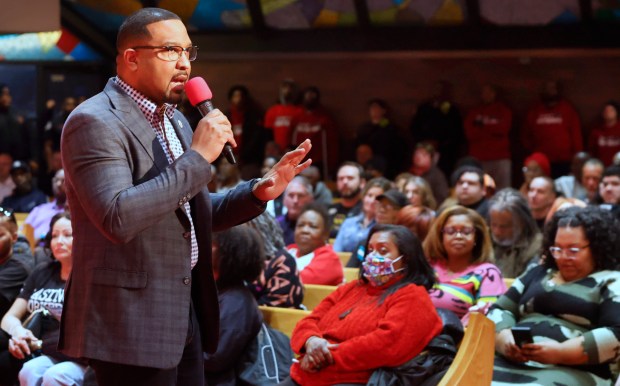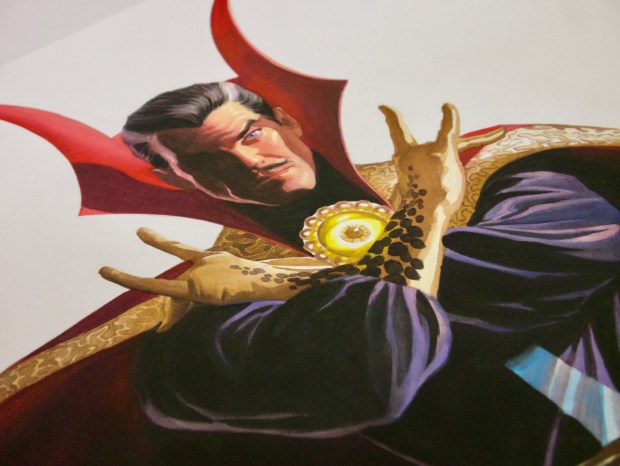After a group of Jewish students erected a sukkah, or temporary wooden structure, on Northwestern University’s campus in Evanston Wednesday at sunset saying they were religiously expressing the Jewish holiday of Sukkot, the university told them to take it down before employees dismantled and removed it after a few hours. The students called that action antisemitic.
Northwestern University’s Vice President of Global Marketing and Communications Jon Yates said the student group Jewish Voice for Peace Northwestern asked the university for permission to set up their sukkah on the campus at Deering Meadow. He said the request was denied because the student group is not registered with the university and the structure does not comply with the university’s display policy. About 12 students who participated in the Sukkot celebration will “face disciplinary action,” Yates said.
Unlike the pro-Palestinian campus demonstrations this past spring, which critics decried as antisemitic, the student group said they were welcoming all Jews and non-Jews to celebrate the holiday and that the act of taking the sukkah down was antisemitic because it is a Jewish religious expression.
The students said that because Sukkot honors the history of Jewish displacement, they were dedicating theirs to Palestinians, the majority of whom have been forced from their homes.
Isabelle Butera, a spokesperson with JVP NU, said the group made its own sukkah, which displayed signs that said, “Gaza Solidarity Sukkah” and “Stop Arming Israel.”
“As an anti-Zionist group of students who believe in a liberated Palestine, given the tens of thousands of Palestinians who’ve been displaced and murdered over the last 70 years, we do not feel comfortable in those spaces that explicitly support (Israel),” said Senior Paz Baum.
Sukkot is an eight-day Jewish holiday celebrating the fall harvest. According to Sarah Wachs, a senior, a sukkah (the plural is sukkot) is traditionally an open wooden structure meant to be a short-term dwelling space to honor past generations of Jews who had to flee troubled times, starting with Israelites fleeing Egypt.
Baum said the sukkah honoring Palestinians was intentional because the sukkah is a symbol for people who are fleeing displacement, which includes her own family members who fled Eastern Europe in World War II.
“For me, that means honoring the Palestinians who are forced out of their homes by gunpoint, with bombs and with grenades that are being funded by the American government and my tuition dollars through Northwestern’s endowment,” she said.
Yates said the university’s display policy prohibits the installation of any three-dimensional display on university property without a university-approved reservation.
The language of the display policy, contained in its 2024-25 student handbook, reads: “Any installation of a 3D display on University property must be reserved through the Outdoor Event Request Process, whether the installation is meant for art, advertisement, viewpoint expression, demonstration, or another purpose. Outside of University-sponsored events, installation of tents is prohibited…Students and/or student groups must also provide advance notice to Student Organizations and Activities, or the relevant Student Affairs office in Chicago, for any 3D display. Installations meant for demonstration must comply with the Demonstration Policy.”
Had the sukkah remained in place, Baum said the group would have stayed out for eight days straight and invited Jewish and non-Jewish students to come celebrate the holiday with them.
Butera said the group had planned to bring in sleeping bags, offer people food and create opportunities for people to socialize and gather.
The first night’s movie the group was set to watch was “Divine Intervention,” directed by Elia Suleiman, according to Junior Evgany Stolyarov.
The group also attempted to reserve a sound permit from the city of Evanston, but because the group did not receive permission from the university, the permit’s pending approval went from pending to null and void, according to the city’s Community Engagement and Communications Manager Cynthia Vargas.
The Jewish Voice for Peace students did not remove the sukkah after they were “repeatedly informed that they were in violation of Northwestern policy and must remove the structure,” Yates said. University staff ended up removing the structure.
Before the sukkah was removed, Baum said,”We, as Jewish students, are celebrating a holiday that mandates that we create a temporary dwelling for the eight days of Sukkot. And because we are students here, because we want to create space for all Jewish students on campus, we built the sukkah, we put it on our campus, and we are open to any and all Jewish students who want to come celebrate with us,” she said.
Baum said then if the university were remove the sukkah, it would be in contradiction against the university’s stated goal “to keep Jewish students safe on campus.”
“We are a group of Jewish students who are celebrating our holiday. Our holiday mandates that we need a sukkah,” Baum said. “If Northwestern chooses to tear it down, they’re removing the opportunity for the Jewish students of Jewish Voice for Peace to celebrate Sukkot.”
In a statement after the Sukkah’s removal, Butera said “Northwestern has spent all year claiming to care about the well-being of Jewish students, yet they send police to dismantle our sacred Sukkah in the dark of night. This reveals that Northwestern’s claims of caring for Jewish students were really only about punishing any students who speak out for Palestinian freedom. Because we dedicated our Sukkot to the people of Gaza who are currently enduring genocide, Northwestern decided to send in police to harass us.”
A protest encampment by the university’s students against the university’s administration rose up at Northwestern’s Deering Meadow last spring, along with others at dozens of other colleges and universities throughout the United States. The encampment at Northwestern ended with a deal from the university’s administration with promises in investments and inclusivity. In May, University President Michael Schill was called to testify at a Congressional hearing where leaders scrutinized the agreement and grilled him with questions.
Stolyarov, who was at the encampment then, said he viewed the university’s update to its code of conduct, post-encampment, as an act of repression.
“I see it as a further disgusting attempt to, in the names of Jews, repress those speaking out against genocide — And as a Jew, I completely reject that narrative and that idea,” he said.





